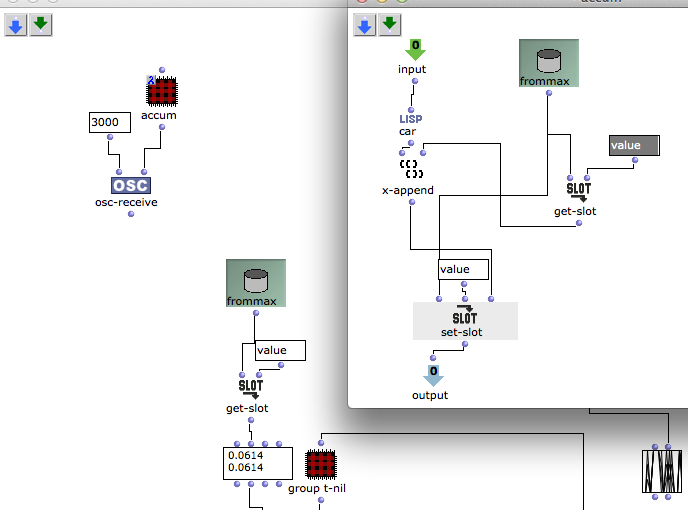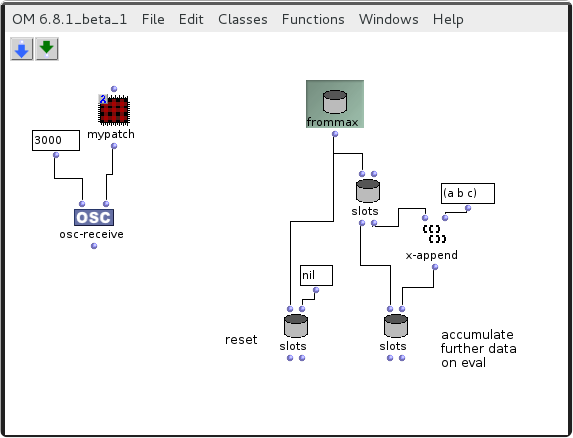Hi Michele and all,
since you’ve been testing the reacif-lib, I have a question for you (always regarding the issue of accumulating multiple messages from OSC). Suppose I have a series of messages arranged like this:
osc://127.0.0.1:3010/param 0.0 0.5571038126945496 0.00035971225588582456 -0.06091249734163284 osc://127.0.0.1:3010/param 1.0 1.187748670578003 0.00035971225588582456 0.044781528413295746 osc://127.0.0.1:3010/param 2.0 0.6294140219688416 0.00035971225588582456 0.013506295159459114 osc://127.0.0.1:3010/param 3.0 1.7329837083816528 0.00035971225588582456 0.012245512567460537 osc://127.0.0.1:3010/param 4.0 1.3821840286254883 0.00035971225588582456 0.012158313766121864
… [999 ms delay]
osc://127.0.0.1:3010/param 0.0 0.5571038126945496 0.00035971225588582456 -0.06091249734163284 osc://127.0.0.1:3010/param 1.0 1.187748670578003 0.00035971225588582456 0.044781528413295746 osc://127.0.0.1:3010/param 2.0 0.6294140219688416 0.00035971225588582456 0.013506295159459114 osc://127.0.0.1:3010/param 3.0 1.7329837083816528 0.00035971225588582456 0.012245512567460537 osc://127.0.0.1:3010/param 4.0 1.3821840286254883 0.00035971225588582456 0.012158313766121864
… [999 ms delay]
osc://127.0.0.1:3010/param 0.0 0.5571038126945496 0.00035971225588582456 -0.06091249734163284 osc://127.0.0.1:3010/param 1.0 1.187748670578003 0.00035971225588582456 0.044781528413295746 osc://127.0.0.1:3010/param 2.0 0.6294140219688416 0.00035971225588582456 0.013506295159459114 osc://127.0.0.1:3010/param 3.0 1.7329837083816528 0.00035971225588582456 0.012245512567460537 osc://127.0.0.1:3010/param 4.0 1.3821840286254883 0.00035971225588582456 0.012158313766121864 osc://127.0.0.1:3010/param 5.0
…
where the “bundles” of triples of reals (each preceded by an ID number like 1.0, 2.0, 3.0, etc…) are sent separated by a small time delay of 999 ms. I guess I should use something like timed-coll, because I’d need to group each bundle of messages, considering the messages in each bundle as simultaneous.
So: how would you use the reactif-lib (and timed-coll in particular) to process the OSC messages according to this “bundling”? The result to be written in a textfile object, should look like this (i.e. a list of lists):
(0.5571038126945496 3.5971225588582456E-4 -0.06091249734163284
1.187748670578003 3.5971225588582456E-4 0.044781528413295746
0.6294140219688416 3.5971225588582456E-4 0.013506295159459114 1.7329837083816529 3.5971225588582456E-4 0.012245512567460537
1.3821840286254883 3.5971225588582456E-4 0.012158313766121865 …)
(0.5571038126945496 3.5971225588582456E-4 -0.06091249734163284
1.187748670578003 3.5971225588582456E-4 0.044781528413295746
0.6294140219688416 3.5971225588582456E-4 0.013506295159459114
1.7329837083816529 3.5971225588582456E-4 0.012245512567460537
1.3821840286254883 3.5971225588582456E-4 0.012158313766121865 …)
(0.5571038126945496 3.5971225588582456E-4 -0.06091249734163284
1.187748670578003 3.5971225588582456E-4 0.044781528413295746
0.6294140219688416 3.5971225588582456E-4 0.013506295159459114
1.7329837083816529 3.5971225588582456E-4 0.012245512567460537
1.3821840286254883 3.5971225588582456E-4 0.012158313766121865 …)
Thanks for your kind attention.
Best regards,
Francesco Vitale



